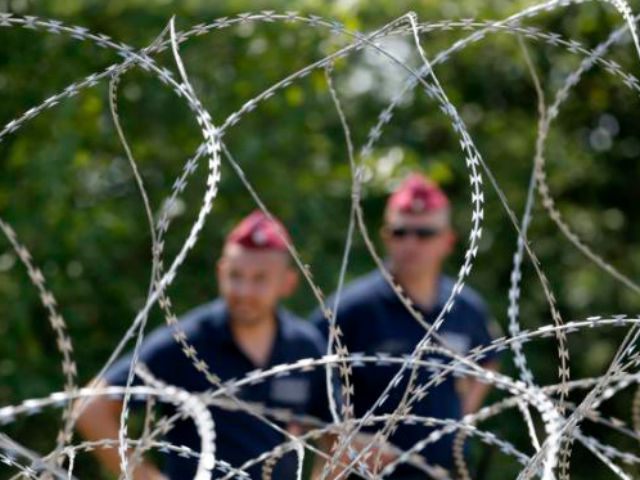The Hungarians are responding to a record-breaking wave of “migrants” from the war zones of the post-Obama Middle East by constructing one of those border fences that’s supposed to be impossibly expensive and ineffective. According to the Associated Press, the fence will be up to 13 feet high, rising behind three layers of razor wire, ranging along the 109-mile border with Serbia through which migrant populations have been pouring.
About 140,000 migrants have trooped through Hungary so far this year – over three times as many as they handled in all of 2014, according to the AP, and it’s only August. Monday saw 2,093 migrants detained by Hungarian police in a single day, well above the astounding daily average of 1,493. Another ten thousand poured over the Macedonian border over the weekend, with a fresh thousand camped in Serbia and preparing to move across the Hungarian border. Macedonia, in turn, has seen over 43,000 migrants in just the past two months.
After imposing the cost of their presence upon the Hungarians, most of this migratory population presses on to the greener pastures of “richer European Union countries like Germany or the Netherlands before their claims are settled.” Among other things, this has produced a massive security and humanitarian crisis along the English Channel, as migrants strive to make the final push from France into the lavish welfare state of Britain.
This might cause the usual carping from fashionable elites against anyone who would dare to interfere with mass migration to become a bit more muted as Hungary works on its fence, but it hasn’t been entirely stifled. “Building fences, using tear gas and other forms of violence against migrants and asylum seekers, detention … will not stop migrants from coming or trying to come to Europe,” sniffed Francois Crepau, the U.N. special rapporteur on the human rights of migrants. “Let’s not pretend that what the EU and its member states are doing is working. Migration is here to stay.”
Migration is here to stay. Easy for elites who live far from the border states to say, isn’t it? The people who actually have to deal with the daily reality of massive population shifts, conducted without the slightest thought of securing their consent, tend to be a bit more eager for their expensive governments to enforce border integrity. What’s the point of having a border at all, if any sufficiently large and motivated group is free to barge across it?
One cannot blame the refugees for fleeing the bloody chaos European elites have made of the Middle East, in concert with the Obama Administration, but European citizens are the ones who end up paying the price in humanitarian costs, economic crises, social stress, and crime. Anger is mounting across the Western world that its political class has unilaterally dissolved the concept of national identity and citizenship, frankly equating insistence upon those points of law with racism, cruelty, and selfishness. The people of Western “democracies” are wondering if they’ll ever be allowed to cast a vote on all of that, before migration permanently alters their political systems.
Hungary finds itself wrestling with all the usual arguments about whether border security is possible, even along a relatively tiny border. The New York Times describes their fence project as “a much criticized and very physical manifestation of the quandary of the migration crisis and the lack of cooperation among European Union nations as they struggle to deal with it.”
The Times describes both pro- and anti-migrant demonstrations in Germany, whose Interior Minister, Thomas de Maiziere, “notably demurred when invited to criticize Hungary’s fence at a news conference last week.” He went on to suggest that Hungary might not need to build a fence, if other European states observed “existing rules,” by which he means all of Europe pitching in to deal with the migrant crisis, instead of leaving border states like Greece, Italy, and Hungary, plus favored migrant destinations such as Germany and the U.K., to shoulder the burden.
Among the criticisms of Hungary’s fence related by the NYT are assurances that determined migrants will use Google and Facebook from their smartphones to get around it, or simply climb over it. The Times even floats the idea that the fence will make Hungary’s migrant problem worse, because refugees will try to race across the border before the fence is completed at the end of August.
As quoted by the Associated Press, the Hungarian government counters that the fence, plus an increased security presence and harsh penalties for fence-jumpers, will dramatically reduce the migrant flow. “International experience shows that (a fence) can make the number of illegal migrants fall to one-fifth or one-seventh,” said government spokesman Zoltan Kovacs, who insisted it was in the interest of both Hungarians and Europeans to “develop some kind of order or regularity.”
He also warned that European cities could “face an unsustainable situation” if the migrant flow was not halted at the border states. The Macedonians and Serbians, on the other hand, have realized it’s in their best interests to hurry the migrant waves along to their final destinations as quickly as possible. The Macedonians even built a reception center to hand out legal documents and get the new arrivals loaded onto buses and trains. The eastern and western precincts of Europe need to get on the same page about this migratory crisis, and fast.

COMMENTS
Please let us know if you're having issues with commenting.